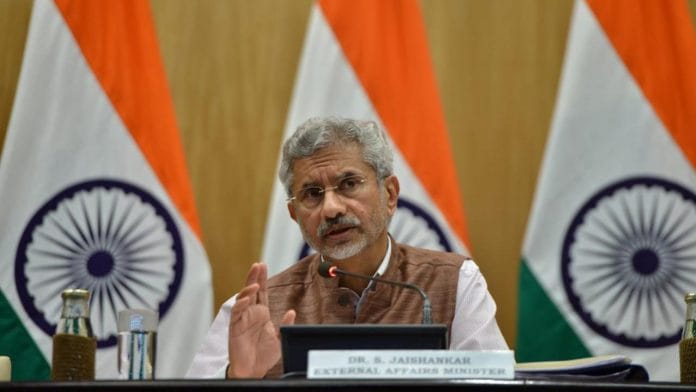New Delhi: Union External Affairs Minister S. Jaishankar said Saturday that the Indian and Chinese troops are deployed “very close to each other” in Ladakh but the process of disengagement and de-escalation is going on. “It is a work in progress,” Jaishankar added, addressing the 2020 edition of the India Global Week, a three-day virtual seminar.
Jaishankar said the process to bring down temperatures at the Line of Actual Control (LAC) is on, as agreed between New Delhi and Beijing, which are talking to each other regularly at the military and diplomatic levels to defuse tensions.
“What’s just happened is that we’ve agreed on the need to disengage because the troops are deployed very close to each other,” he said.
“So there is a disengagement and de-escalation process, which has been agreed upon, it has been just commenced. It is very much a work in progress,” he added.
Jaishankar’s statements come days after the Indian and Chinese armies launched a disengagement exercise at several flashpoints along the Line of Actual Control (LAC) following weeks of tensions since May. The current spate of tensions also led to a violent face-off between soldiers of the two sides on 15 June, leading to 20 deaths on the Indian side and an unconfirmed number among Chinese troops.
The disengagement exercise is believed to have gained pace after National Security Adviser (NSA) Ajit Doval and Chinese Foreign Minister Wang Yi held talks last Sunday to discuss the border tensions. Doval and Wang serve as the Indian and Chinese special representatives on the boundary question.
In a phone conversation, Doval and Wang agreed on “earliest complete disengagement” and re-affirmed that “both sides should strictly respect and observe the Line of Actual Control and should not take any unilateral action to alter the status quo”.
On Friday, talks were held under the framework of the India-China Working Mechanism for Consultation & Coordination (WMCC) on border affairs, between Naveen Srivastava, joint secretary (East Asia), and Wu Jianghao, director general of the department of boundary and oceanic affairs in the Chinese Ministry of Foreign Affairs.
Also Read: How India lined up US, Russia on its side of LAC and China was forced to return friendless
The post-Covid world
In his remarks, Jaishankar weighed in on the stress that the concept of multilateralism appears to have come under in recent times.
According to Jaishankar, even before the coronavirus pandemic had set in, countries were “behaving more nationalistically, looking out for themselves”. This, he said, led to more arguments, impacting the trust factor, while raising questions on global supply chains.
“It’s going to be a more difficult world,” he said, adding that multilateralism will not be under crisis but “will be under stress” as countries continue to adjust with each other in a post-Covid world.
“Along with weakening multilateralism you have weakening multipolarity,” he said.
On the issue of India and Australia coming closer bilaterally, and also under the Indo-Pacific framework, Jaishankar said, “There are also strong structural reasons why India and Australia are doing very much more with each other.”
“Australia… today has considerable weight, considerable influence… When you look at the world today, when the regional architecture is much more loose and open-ended than what it used to be before, it is important for countries to look at different countries and see if they can work together … There is a sense today in Australia and sense in India that if you want a more secure, more stable world, then countries like India and Australia need to come together,” he said.
During a virtual bilateral meeting between Prime Minister Narendra Modi and his Australian counterpart Scott Morrison last month, both sides vowed to enhance their Comprehensive Strategic Partnership by way of signing the long-pending Mutual Logistics Support Agreement that will seek to increase military inter-operability through defence exercises.
India has reportedly decided to invite Australia to join the annual Malabar naval exercise, which also includes the US and Japan. So far, India hadn’t been keen to invite Australia over apprehensions that it might upset China.
Also Read: Spoke to Jaishankar on China’s aggression many times, India did its best to respond: Pompeo







In the name of security, guarding territories during struggle people are getting killed. It is not that who killed whom. It is loss.of valuable life. The countries which are in constant conflict in a few inches land should sit together and finalise an acceptable map to all with mutual consultation, ironing out the disputes by giving up a claim so that everlasting permanent peace along the borders can be realised. This reduces personnel guarding requirements. Lives can be saved.